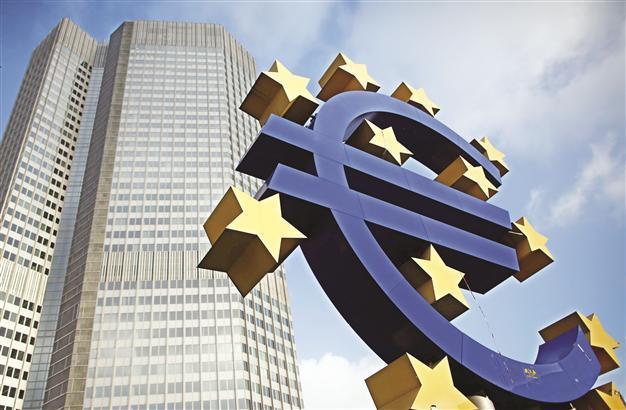EU strikes deal to bring banks under single body
BRUSSELS - Reuters

A euro currency sign is seen in front of the European Central Bank (ECB) headquarters in Frankfurt, Germany. The European Union agreed to hand the ECB the authority to directly police at least 150 of the eurozone’s biggest banks and intervene in smaller banks at the first sign of trouble. REUTERS photo
Europe clinched a deal yesterday to give the European Central Bank (ECB) new powers to supervise eurozone banks from 2014, embarking on the first step in a new phase of closer integration to help underpin the euro.After more than 14 hours of talks and following months of negotiations, finance ministers from the European Union’s 27 countries agreed to hand the ECB the authority to directly police at least 150 of the eurozone’s biggest banks and intervene in smaller banks at the first sign of trouble.
“This is a big first step for banking union,” EU Commissioner Michel Barnier told a news conference. “The ECB will play the pivotal role, there’s no ambiguity about that.”
Merkel praises accord
German Chancellor Angela Merkel praised the new accord. Addressing lawmakers in the Bundestag lower house of Parliament, she said the deal clinched earlier in Brussels just hours before an EU summit was of inestimable value and had met German concerns.
“It cannot be valued highly enough that eurozone finance ministers agreed overnight on a legal framework and the outlines of a common supervisory mechanism for banks,” she said.
After three years of piecemeal crisis-fighting measures, agreeing on a banking union lays a cornerstone of wider economic union and marks the first concerted attempt to integrate the bloc’s response to problem banks.
The new system of supervision should be up and running by March 1, 2014, following talks with the European Parliament, although ministers agreed that could be delayed if the ECB needed longer to prepare itself.
The plan sets in motion one of the biggest overhauls of any European banking system since the financial crisis began in mid-2007 with the near collapse of German lender IKB.
The onus is now on EU leaders, who were scheduled to hold meetings in Brussels yesterday and today, to give it their full political backing. In an about-turn, German Finance Minister Wolfgang Schaeuble dropped earlier objections that had led him to clash openly with his French counterpart, Pierre Moscovici, last week over the ECB’s role in banking supervision. With time running out to meet a year-end deadline, both sides managed to settle their differences and Germany won concessions to temper the authority of the ECB’s Governing Council over the new supervisor.
Agreement on bank surveillance is a crucial first step towards a broader banking union, or common eurozone approach to dealing with failing banks that in recent years dragged down countries such as Ireland and Spain. The next pillar of a banking union would be the creation of a central system to close troubled banks.
30 bln euro threshold
The decision also sends a strong signal to investors that the euro zone’s 17 members, from powerful Germany to stricken Greece, can pull together to tackle the bloc’s problems.
At a summit in June, EU leaders pledged that once a common bank supervisor was in place, the bloc’s rescue mechanism would have the power to directly recapitalize struggling banks.
Countries like France, Italy and Spain are keen for those powers to be in place as soon as possible. But Germany, worried it could be forced to foot the bill for struggling banks across the bloc, is not in a rush. “We have reached the main points to establish a European banking supervisor that should take on its work in 2014,” Schaeuble told reporters. “We stand by what we agreed, to bring Europe forward step by step.” In the longer term, there is also disagreement over how the burden of winding down failed banks should be shared.
The deal foresees banks with assets of 30 billion euros, or larger than one-fifth of their country’s economic output, being supervised by the ECB rather than national supervisors. France’s Moscovici said that would put more than 150 banks under the ECB’s watch.
Critically, it also gives the ECB authority to widen its authority to smaller banks if problems arise.
That will satisfy Germany, which wanted to maintain primary oversight of its savings and cooperative banks, nearly all of which will not fall under direct surveillance from Frankfurt unless they run into problems.
















